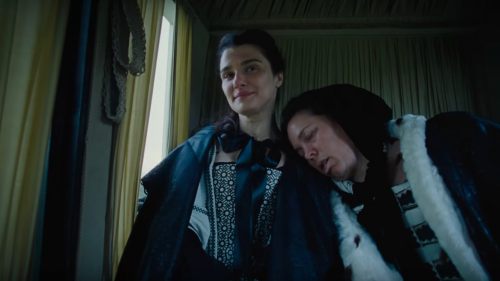The Deadpan Delivery Of THE LOBSTER And THE KILLING OF A SACRED DEER
Get your The Killing of a Sacred Deer tickets here!
Collin Farrell is the major connecting thread between Yorgos Lanthimos’ last two films. They seem tonally similar at first glance - bizarre worlds where human beings speak almost without emotion, led by withheld, awkward performances by Farrell and company. A peek at the first line of each film’s Wikipedia ought to differentiate them though: The Lobster is a 2015 absurdist dystopian black comedy. The Killing of a Sacred Deer is a 2017 psychological horror-thriller. They are both distinctly Yorgos Lanthimos, absurd works employing a specific approach to directing actors like few others in modern cinema, yet they are worlds apart precisely because of how this approach takes shape in either context.
In The Lobster, Farrell’s newly single David surrenders to a prison in the form of a holiday retreat. Per the rules of this future society, he must find a new romantic partner within a period of forty five days. Failure to do so would mean being turned into an animal via surgical transformation. Sounds simple enough, right? To complicate matters though, his other option is a cabal of rogue single folk hunted by the prospective couples, residing in the woods just outside the resort. Their rules? So much as flirt and you’ll have your tongue ripped out. Enter into any form of sexual or romantic relationship and suffer the ruthless consequences.
The Lobster’s world of romantic and sexual extremes are the source of its deadpan oddity. Farrell and fellow bachelors Ben Whishaw and John C. Reilly may speak with monotone cadence, but their demeanor constantly belies a familiar desperation. The runt of the social litters have all found themselves in this hotel, accompanied by the pressures of a coupling-as-default mindset pushed to its comedic extreme as they flail and flounder and even give themselves nose-bleeds in order to connect with people. The connections are rarely genuine though. These men and women are rigid, scaled back and over-enunciated in their interactions for the purposes of social etiquette (there are eyes on them constantly, and their romance must be within specific, pre-determined parameters), so the desperation that lurks underneath is not longing or desire, but mere survival instinct.
Every time either Farrell, Whishaw or Reilly approaches a woman, he pays her stiff compliment. The women usually respond with the same, but their ability to speak honestly (or even dance honestly) has been kneecapped at an early age by a society that makes every social situation one of incredibly high stakes. Their demeanor is learned. Conditioned, so as to navigate a world where singledom comes with a death sentence, hiding how they really feel behind a veneer of arcane decorum, a dynamic that comes to the forefront when Farrell’s David escapes to the woods and meets Rachel Weisz. Here, he must maintain his stiff upper lip in order to continue falling in line, but their genuine feelings for one another result in a similar dichotomy. A straightforward awkwardness, part conditioned and part put-on to disguise intention, only this time what’s being disguised as following the rules isn’t mere survival. It’s real love in the opposite scenario, wherein love (and not singledom) is the punishable offense.
It’s here that David’s dilemma becomes clear. He will never truly have a choice when it comes to expressing himself in this world of extremes – early on, the hotel prevents him from enlisting as bisexual – and what little decorum he’s able to wear as disguise is his only means to survive. Farrell’s Steven Murphy however, is a case of deadpan delivery born of absurd apathy.
In The Lobster, David’s stiffness comes off as a product of suffocation. There’s a loneliness behind his eyes, and he feels like he could break down at any moment. In The Killing of a Sacred Deer, Steven feels made of stone. He exhibits no emotions beyond occasional rage. In this film, Farrell’s eyes are cold.

Steven is well beyond survival in Sacred Deer. His home, his job, his wife, his family, they’re all indicative of having “made it.” The American dream, as it were, and his concerns of self-preservation all stem from the desire to maintain this pristine façade. Even when his son and daughter are in danger, his concerns are not admitting to the mistakes he made in order to keep them safe, but finding a way to have his cake and eat it too so he can stay on a linear path. He wants it all, even if it means twisting facts and skewing logic to the point of nonsense in order to absolve himself of blame.

Farell is matched here by Barry Keoghan, whose young Martin comes off similarly. There’s an element of surrogate fatherhood to their relationship, but Martin’s subtle revenge scheme – beginning with working his way into Steven’s family – turns their dynamic on its head. While intent is constantly hidden in The Lobster, it takes center stage in Sacred Deer. David and his bachelor buddies disguise and suppress subtext beneath layers of rehearsed responses, making The Lobster one of the most human absurdist works in recent years, but Steven and Martin’s words have no subtext at all. From a human perspective, they fall right into an uncanny crevice.
Our eyes are rarely allowed to look away from them. The camera meets their gaze for long periods as they speak, and the otherwise passive process of accepting a character's humanity becomes an active investigation. Sometimes it yields positive results. Nicole Kidman and Reffey Cassidy as Steven's wife and daughter take after him in mannerism, but their eyes constantly belie simple desires of romance, survival and protection. Most of the time though, when the camera remains transfixed on Farrell and Keoghan, our search for humanity comes up short, and there is nothing more horrifying.
They constantly speak their intent in ways that most human beings do not. They never ground their intent in emotions that would allow us to empathize with them – anger, regret, betrayal, what have you – coming off as half-formed versions of full human beings, but intent and intent alone is fundamental to their bizarre candor. It’s their intent that’s poisonous, coming from desires to hurt, to extract vengeance and to absolve oneself of sin, and by severing any ties these objectives might have to real-world motivations rooted in relationships, Lanthimos is able to paint an ugly, unsettling picture of all we are capable of without any room to justify it.
Yorgos Lanthimos is a unique absurdist voice, and part of that voice is his ability to direct actors against their instincts. Performance is by nature an outward expression even when it’s subtle, but by reeling his performers in, Lanthimos is able to amplify the effect of his text by making us, the audience, lean forward and search for the truth in his characters. Sometimes that means seeing a reflection of our loneliness behind words and actions that must be contained. Sometimes it means finding nothing but our worst impulses even in closeup. In either case, it forces us to engage and to seek out those parts of ourselves we may not always be eager to confront.



